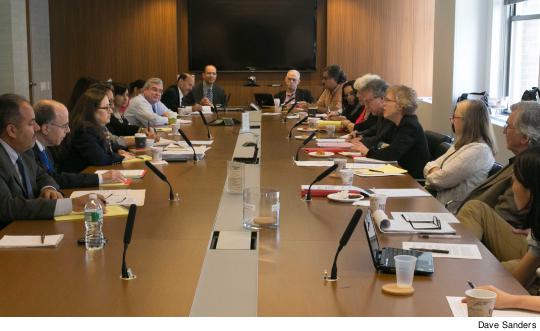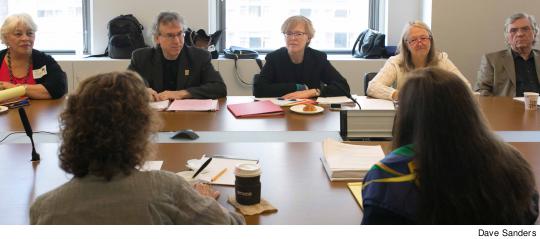 |
Negotiators for the PSC and CUNY management met on June 20 at the CUNY central office for a formal three-hour bargaining session. PSC President Barbara Bowen said she expects to see “intense negotiations over the summer.”
At the June 20 session, the two sides exchanged demands and discussed each side’s priorities for a new collective bargaining agreement. Speaking for the PSC bargaining team, Bowen presented the PSC’s demands, an updated version of the bargaining agenda approved by the Delegate Assembly in 2010. “Our four priorities,” she told Clarion, “are salaries, rebalancing the full-time faculty teaching load to allow more time with students and more time with research, measurable progress on equity for adjuncts, and a career advancement system for HEOs.”
Back to the Table
At the bargaining table, Bowen emphasized the PSC’s view that there is a particular opportunity in the next few months, with New York City and State both open to settling union contracts, to get the PSC contract done.
While understanding the terms being negotiated with other public-sector unions in New York, she said, the PSC remains determined to press for its members’ demands. The union expressed the urgency of securing an economic offer that allows for salary increases and other needs – especially after years without a contract.
“We have accomplished major structural changes in previous contracts, when some thought such changes would be impossible,” Bowen noted. “We believe it’s possible to achieve similar breakthroughs now.”
Pamela Silverblatt, CUNY’s vice chancellor for labor relations, presented management’s demands, many of which have appeared in previous rounds of bargaining. She expressed a desire to build on the two sides’ record of success in negotiating agreements in recent years. The union bargaining team is analyzing CUNY’s demands and will report on them in more detail shortly.
Member Action
Progress toward a new PSC-CUNY agreement has become more possible now that the Bloomberg-era freeze in municipal labor relations has begun to thaw. In his final term, Mayor Michael Bloomberg’s one-sided insistence on union concessions and his refusal to budget for City worker raises led to an unprecedented situation: When he left office, every one of 152 bargaining units was working under an expired contract.
With Mayor Bill de Blasio’s administration in office, “bargaining [is] back in style,” commented the civil-service weekly The Chief. While City unions may not get all they want, “meaningful bargaining between the city and its labor unions” has replaced Bloomberg’s “my-way-or-the-highway approach to wage-contract talks,” Chief editor Richard Steier wrote in March.
That shift led to a May 1 contract settlement with the United Federation of Teachers (UFT), ratified with 77% support in a membership vote announced at the beginning of June. Other long-overdue agreements are expected to follow soon.
While the PSC negotiates with CUNY management, not the City of New York, CUNY must get City and State backing for any economic offer to the PSC. That support generally isn’t offered until other public-worker settlements are in place. While the largest State worker contracts were ratified in 2011, the contract for SUNY instructional staff was settled in 2013 and transit workers settled this year. In the current PSC-CUNY talks, discussions with the City and State are ongoing.
 |
“There’s now real momentum to get contracts settled,” Bowen told the PSC Delegate Assembly on June 19, the night before the bargaining session. “Having had this logjam for three years, the City is now trying to get all its expired contracts concluded very quickly.”
Outlining the PSC’s priorities on salaries, teaching load, part-timer equity and HEO advancement, Bowen told delegates, “I give you a commitment that we will fight as hard as we can for each of them.”
As negotiations between the PSC and CUNY management intensify, she said, PSC members should be ready to take action. “We should not think that what happens in negotiations happens only at the bargaining table,” Bowen emphasized. “It is membership support that has enabled us to be strong in other rounds of bargaining.” In this round as well, she said, “we will need to call on members to make their voices heard.”
“So expect to be needed this summer,” she concluded. “It’s going to be a fight for us – and we are capable of that.”
Bargaining Updates
Frank Mirer, a union delegate and a professor of environmental and occupational health at Hunter, asked if periodic bulletins on negotiations would be sent to PSC members. “I don’t expect to get every detail,” Mirer said, “but to get some description would be useful.”
Bowen said that bargaining updates would be provided, primarily through the union’s weekly email newsletter, This Week in the PSC. (To get on the list for these updates, sign up here.
While not everything in contract talks can be discussed in public, she said, it is essential for the bargaining team to keep PSC members informed – and every member should pay attention.
“Watch for messages throughout the summer,” Bowen advised. “Sometimes there are no developments, but sometimes things happen fast.”
Teachers and Transit Workers
The new UFT contract covers an unusually long period – nine years, from the previous agreement’s expiration in 2009 through 2018. Retroactive pay will be stretched out even longer, with the last payments made in 2020. The retro pay was nonetheless seen by most observers as a major union victory: Bloomberg, newspaper editorial boards and pro-business policy groups had issued dire warnings that back pay for City workers would be “unaffordable.”
A tentative settlement of a new transit workers’ contract was also ratified by a wide margin, winning 82% support in results announced on May 19. The five-year contract provides members of Transport Workers Union Local 100 with 8.25% in raises over the life of the agreement. While it also includes some union concessions, it notably does not include the three years of 0% raises that Governor Andrew Cuomo had imposed on the main State worker unions, an example he had urged the MTA to follow. (For details on the new UFT and TWU Local 100 contracts, see the May issue of Clarion at.)
“There’s going to be a mass rush for other unions to get in there and resolve their contracts,” Harry Nespoli, chair of the Municipal Labor Committee, told The Chief. “What the UFT did with their ratification was open the door for other unions” to reach their own agreements.
______________________________
RELATED COVERAGE: PSC and CUNY reach other agreements

